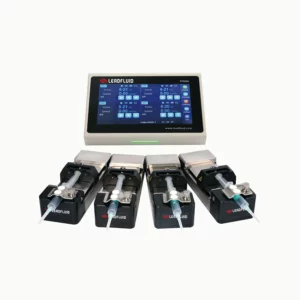In the field of fluid handling technology, the development of syringe pumps is critical to revolutionizing Lab research and industrial manufacturing processes. High pressure syringe pumps, lab syringe pumps and industrial syringe pumps focus on precision, reliability and versatility and have become indispensable tools for scientists, researchers and engineers in various fields.
High Pressure Syringe Pumps: Precision Under Extreme Conditions
High pressure syringe pumps are designed to provide precise fluid control even under extreme pressure conditions, making them indispensable in applications where precision and reliability are critical.

Features and Benefits
- Precise Control: Advanced microprocessor control algorithms ensure accurate and repeatable flow rates, allowing researchers to achieve precise dosing in high-pressure environments.
- Stability: Rugged construction and innovative sealing mechanism maintain pressure stability, eliminating the risk of leaks and ensuring consistent performance.
- Versatility: The highpressure syringe pump is compatible with a variety of syringe sizes and materials and can be flexibly adapted to different experimental requirements.
- Easy to use: The intuitive software interface and touch-screen display simplify operation and programming, simplifying workflow and reducing the possibility of errors.
Application
- High Performance Liquid Chromatography (HPLC): Highpressure syringe pumps play a vital role in chromatographic separations, where precise solvent delivery is critical for accurate sample analysis.
- Chemical synthesis: In synthetic chemistry, these pumps enable precise metering of reagents and catalysts, facilitating controlled reactions and product synthesis.
- Pharmaceutical Manufacturing: Highpressure syringe pumps are used in drug formulation and delivery systems to ensure accurate dosing of active pharmaceutical ingredients (APIs) and excipients.
Lab Syringe Pumps: Enabling Precision Research
Lab syringe pumps are designed to meet the needs of Lab research, providing researchers with precise control of fluid delivery for a variety of applications.Here are some that have advantages
- Microfluidic Compatibility: lab syringe pumps are optimized for microfluidic experiments, where precise fluid control is critical for manipulating small sample volumes.
- Multi-channel configurations: Some lab syringe pumps offer multi-channel configurations, allowing researchers to deliver multiple reagents or samples simultaneously and have independent control of each channel.
- Integration capabilities: Seamless integration with lab automation systems and software platforms enables high-throughput experiments and data collection.
- Compact Design: Space-saving design and modular configuration make lab syringe pumps ideal for crowded Lab
How Lab Syringe Pumps Work ?
Lab syringe pumps are precision instruments used to deliver precise and controlled amounts of liquids in Lab settings. Here’s how they typically work:
- Mechanism:Lab syringe pumps operate based on a syringe mechanism where a syringe is placed within the pump. The syringe contains the liquid to be dispensed, and the pump applies pressure to push the plunger of the syringe, thereby dispensing the liquid at a controlled rate.
- Control Interface:Syringe pumps are equipped with a control interface that allows users to set parameters such as flow rate, volume to be dispensed, and speed of delivery. This interface can be digital with buttons or touchscreen for easy manipulation.
- Motorized Operation:Most syringe pumps have a motorized drive system that moves the syringe plunger at a consistent and precise speed. This motorized operation ensures accurate and repeatable liquid delivery, important for experiments requiring exact volumes.
- Flow Rate Adjustment:Users can adjust the flow rate of the liquid being dispensed by controlling the speed of the motorized plunger movement. This feature allows for fine-tuning the delivery rate according to the experimental requirements.
- Volume Programming:Lab syringe pumps often allow users to program the total volume of liquid to be dispensed. Once the desired volume is set, the pump will accurately dispense the specified amount without manual intervention, ensuring reproducibility.
- Multiple Syringe Configuration:Some syringe pumps support multiple syringes, enabling parallel or sequential delivery of different liquids. This feature is useful for applications requiring complex fluid handling protocols or mixing of multiple reagents.
- Feedback Control:Advanced syringe pumps may incorporate feedback control mechanisms to monitor and adjust the delivery based on real-time measurements. This ensures precise delivery even in dynamic experimental conditions.
By combining motorized operation, precise control interfaces, and customizable settings, lab syringe pumps provide researchers with a reliable tool for accurate and controlled liquid dispensing in diverse Lab applications.
Industrial Syringe Pumps: Improving Manufacturing Efficiency
Industrial syringe pumps are customized to meet the needs of high-throughput manufacturing environments, providing reliable and scalable fluid handling solutions for industrial production processes.
What Are The Characteristics Of industrial syringe pumps?
- High Throughput: Industrial syringe pumps deliver precise fluid dosing at high speeds, enabling continuous production and minimizing downtime.
- Chemical Compatibility: These pumps are constructed from corrosion-resistant materials and can handle a wide range of chemicals, solvents and reagents used in the manufacturing process.
- Remote monitoring and control: Some industrial syringe pumps offer remote monitoring and control capabilities, allowing operators to oversee the production process from anywhere.
The advent of high pressure syringe pumps, lab syringe pumps, and industrial syringe pumps represents a major milestone in fluid handling technology, giving researchers and manufacturers unprecedented control over fluid delivery and dosage. Whether in the lab or on the production floor, these innovative pumps are advancing progress in every discipline, driving discovery and increasing efficiency in scientific research and industrial manufacturing.